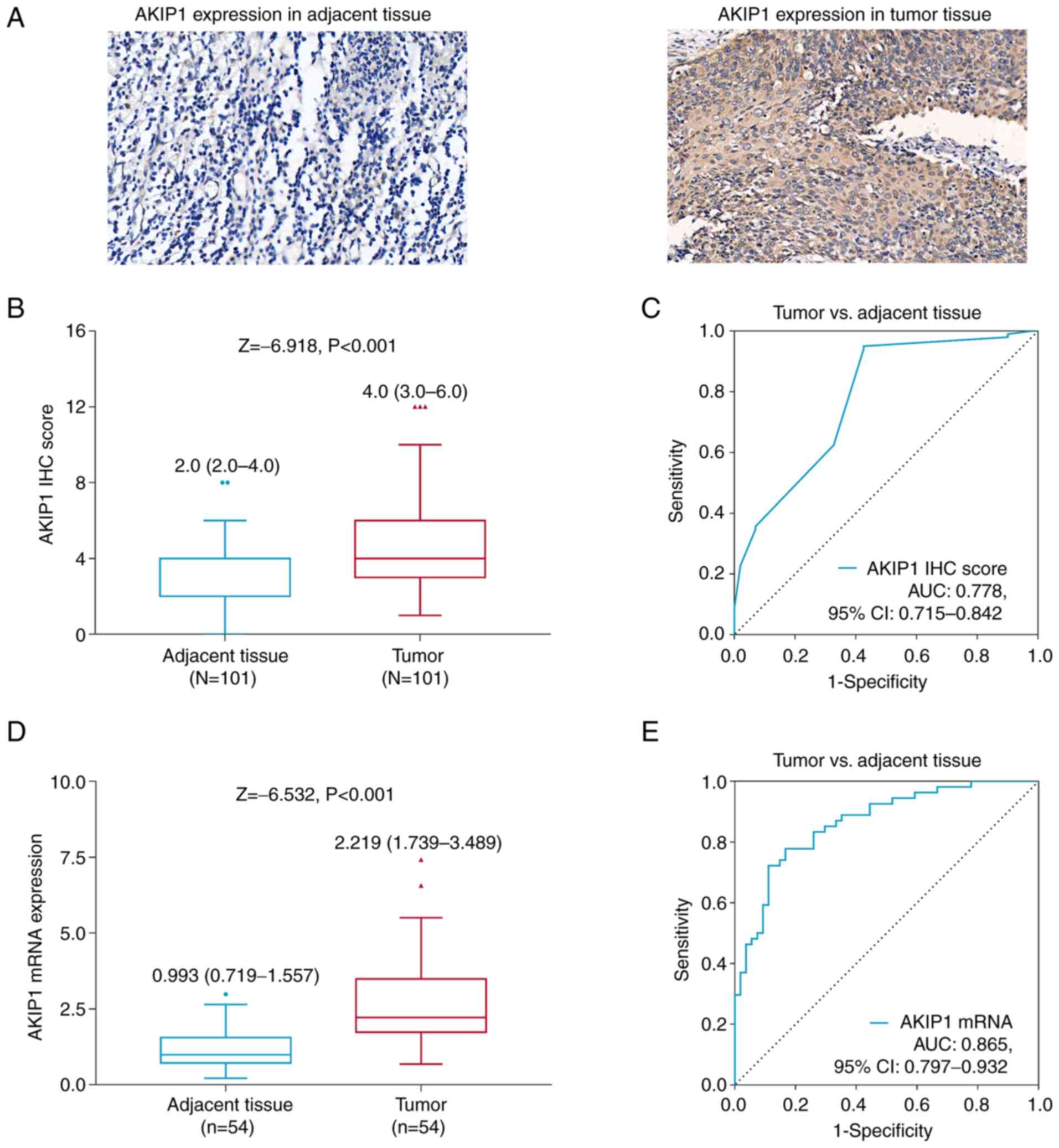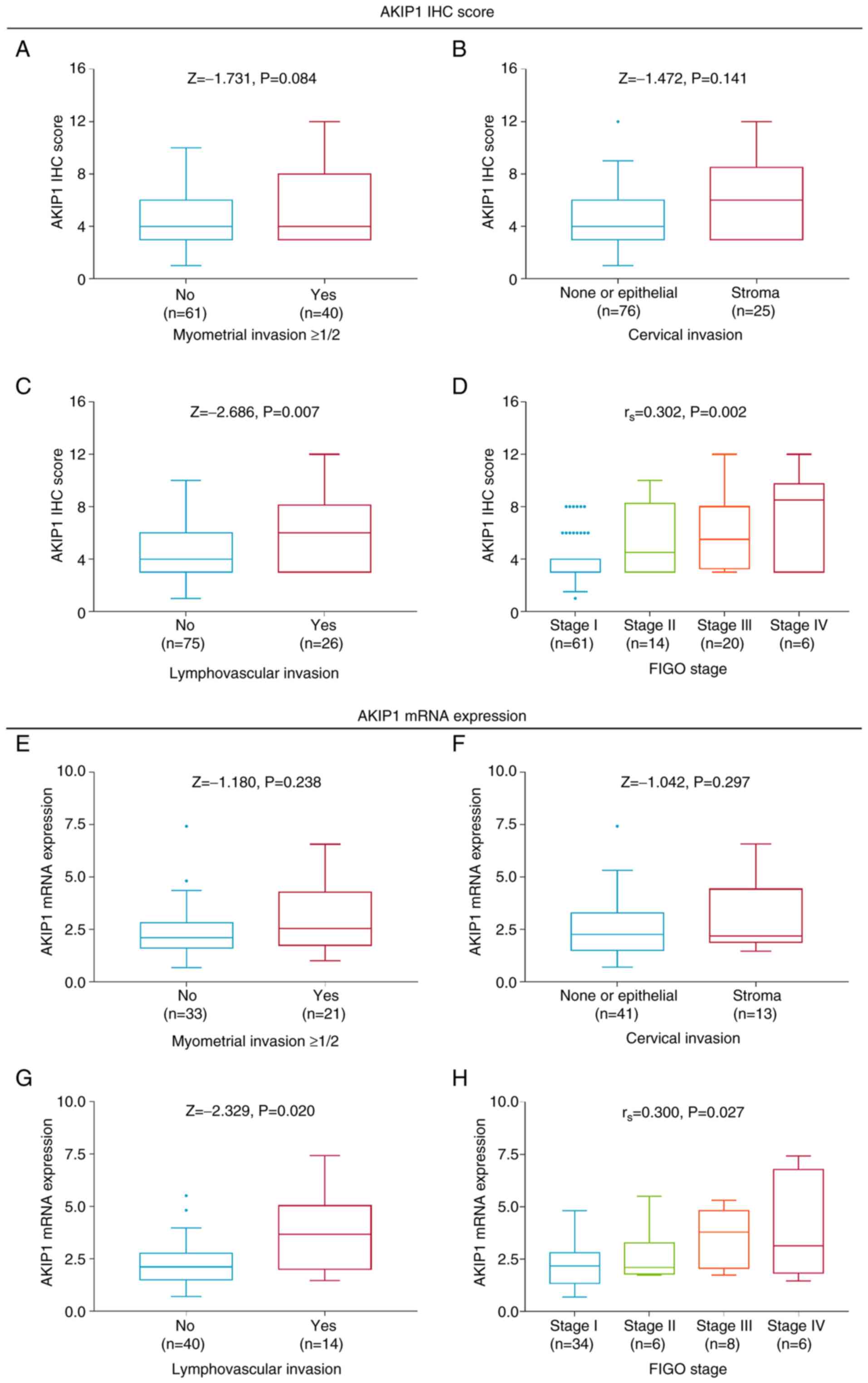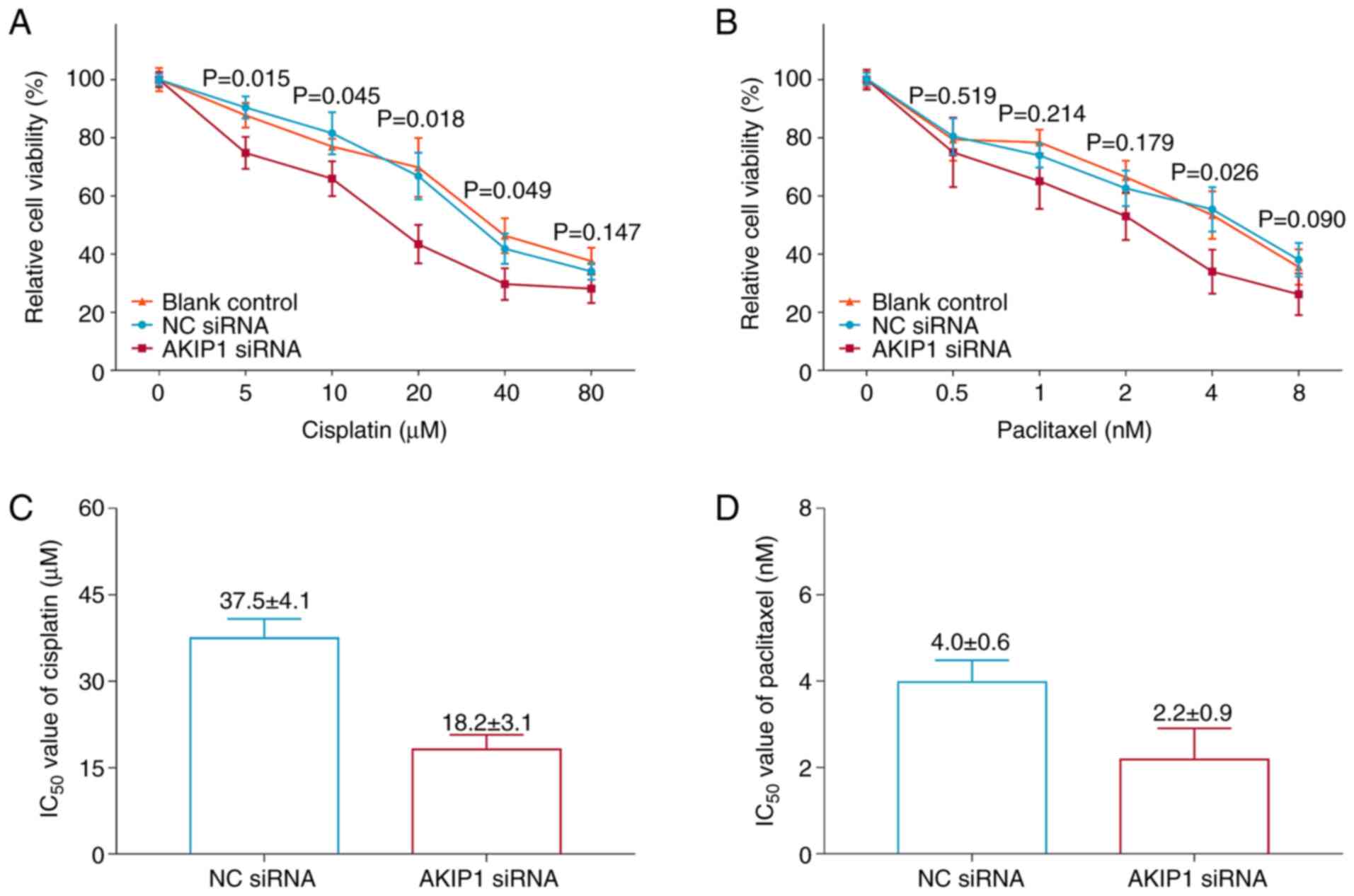|
1
|
Lu KH and Broaddus RR: Endometrial cancer.
N Engl J Med. 383:2053–2064. 2020. View Article : Google Scholar : PubMed/NCBI
|
|
2
|
Lortet-Tieulent J, Ferlay J, Bray F and
Jemal A: International patterns and trends in endometrial cancer
incidence, 1978-2013. J Natl Cancer Inst. 110:354–361. 2018.
View Article : Google Scholar : PubMed/NCBI
|
|
3
|
Lee YC, Lheureux S and Oza AM: Treatment
strategies for endometrial cancer: Current practice and
perspective. Curr Opin Obstet Gynecol. 29:47–58. 2017. View Article : Google Scholar : PubMed/NCBI
|
|
4
|
Koh WJ, Abu-Rustum NR, Bean S, Bradley K,
Campos SM, Cho KR, Chon HS, Chu C, Cohn D, Crispens MA, et al:
Uterine neoplasms, version 1.2018, NCCN clinical practice
guidelines in oncology. J Natl Compr Canc Netw. 16:170–199. 2018.
View Article : Google Scholar : PubMed/NCBI
|
|
5
|
Francis SR, Ager BJ, Do OA, Huang YJ,
Soisson AP, Dodson MK, Werner TL, Sause WT, Grant JD and Gaffney
DK: Recurrent early stage endometrial cancer: Patterns of
recurrence and results of salvage therapy. Gynecol Oncol.
154:38–44. 2019. View Article : Google Scholar : PubMed/NCBI
|
|
6
|
Connor EV and Rose PG: Management
Strategies for recurrent endometrial cancer. Expert Rev Anticancer
Ther. 18:873–885. 2018. View Article : Google Scholar : PubMed/NCBI
|
|
7
|
Zhang X, Liu S and Zhu Y:
A-kinase-interacting protein 1 promotes EMT and metastasis via
PI3K/Akt/IKKβ pathway in cervical cancer. Cell Biochem Funct.
38:782–791. 2020. View
Article : Google Scholar : PubMed/NCBI
|
|
8
|
Zhang W, Wu Q, Wang C, Yang L, Liu P and
Ma C: AKIP1 promotes angiogenesis and tumor growth by upregulating
CXC-chemokines in cervical cancer cells. Mol Cell Biochem.
448:311–320. 2018. View Article : Google Scholar : PubMed/NCBI
|
|
9
|
Peng H, Zhang R and Zhang H: A-kinase
interacting protein 1 high expression correlates with advanced
tumor stage and poor overall survival in surgical patients with
clear cell renal cell carcinoma. Medicine (Baltimore).
99:e207422020. View Article : Google Scholar : PubMed/NCBI
|
|
10
|
Liu Y, Tian J, Qin D, Liu J and Xie Y:
AKIP1 expression in tumor tissue as a new biomarker for disease
monitoring and prognosis in non-small cell lung cancer: Results of
a retrospective study. J Clin Lab Anal. 34:e231282020.PubMed/NCBI
|
|
11
|
Jiang W, Yang W, Yuan L and Liu F:
Upregulation of AKIP1 contributes to metastasis and progression and
predicts poor prognosis of patients with colorectal cancer. Onco
Targets Ther. 11:6795–6801. 2018. View Article : Google Scholar : PubMed/NCBI
|
|
12
|
Cui Y, Wu X, Lin C, Zhang X, Ye L, Ren L,
Chen M, Yang M, Li Y, Li M, et al: AKIP1 promotes early recurrence
of hepatocellular carcinoma through activating the
Wnt/β-catenin/CBP signaling pathway. Oncogene. 38:5516–5529. 2019.
View Article : Google Scholar : PubMed/NCBI
|
|
13
|
Wan X, Hong Z, Mao Y and Di W:
Correlations of AKIP1, CXCL1 and CXCL2 expressions with
clinicopathological features and survival profiles in cervical
cancer patients. Transl Cancer Res. 9:726–734. 2020. View Article : Google Scholar : PubMed/NCBI
|
|
14
|
Amant F, Mirza MR, Koskas M and Creutzberg
CL: Cancer of the corpus uteri. Int J Gynaecol Obstet. 143 (Suppl
2):S37–S50. 2018. View Article : Google Scholar : PubMed/NCBI
|
|
15
|
Fang T and Lu Q: A-kinase interacting
protein 1 (AKIP1) associates with advanced overall disease
condition, tumor properties, and unfavorable prognosis in
hepatocellular carcinoma patients. J Clin Lab Anal. 34:e232132020.
View Article : Google Scholar : PubMed/NCBI
|
|
16
|
Hu Z, Gu X, Zhong R and Zhong H:
Tumor-infiltrating CD45RO+ memory cells correlate with
favorable prognosis in patients with lung adenocarcinoma. J Thorac
Dis. 10:2089–2099. 2018. View Article : Google Scholar : PubMed/NCBI
|
|
17
|
Livak KJ and Schmittgen TD: Analysis of
relative gene expression data using real-time quantitative PCR and
the 2(−Delta Delta C(T)) method. Methods. 25:402–408. 2001.
View Article : Google Scholar : PubMed/NCBI
|
|
18
|
Gagnon V, Van Themsche C, Turner S,
Leblanc V and Asselin E: Akt and XIAP regulate the sensitivity of
human uterine cancer cells to cisplatin, doxorubicin and taxol.
Apoptosis. 13:259–271. 2008. View Article : Google Scholar : PubMed/NCBI
|
|
19
|
Hoekstra AV, Ward EC, Hardt JL, Lurain JR,
Singh DK, Buttin BM, Schink JC and Kim JJ: Chemosensitization of
endometrial cancer cells through AKT inhibition involves FOXO1.
Gynecol Oncol. 108:609–618. 2008. View Article : Google Scholar : PubMed/NCBI
|
|
20
|
Tang Y, He Y, Zhao N, Chen Y, Xing J and
Tang N: Sirtuin2 correlates with lymph node metastasis, increased
FIGO stage, worse overall survival, and reduced chemosensitivity to
cisplatin and paclitaxel in endometrial cancer. Ir J Med Sci.
191:147–154. 2022. View Article : Google Scholar : PubMed/NCBI
|
|
21
|
Lin C, Song L, Liu A, Gong H, Lin X, Wu J,
Li M and Li J: Overexpression of AKIP1 promotes angiogenesis and
lymphangiogenesis in human esophageal squamous cell carcinoma.
Oncogene. 34:384–393. 2015. View Article : Google Scholar : PubMed/NCBI
|
|
22
|
Hanahan D and Weinberg RA: Hallmarks of
cancer: The next generation. Cell. 144:646–674. 2011. View Article : Google Scholar : PubMed/NCBI
|
|
23
|
Guo X, Zhao L, Cheng D, Mu Q, Kuang H and
Feng K: AKIP1 promoted epithelial-mesenchymal transition of
non-small-cell lung cancer via transactivating ZEB1. Am J Cancer
Res. 7:2234–2244. 2017.PubMed/NCBI
|
|
24
|
Chen D, Cao G and Liu Q:
A-kinase-interacting protein 1 facilitates growth and metastasis of
gastric cancer cells via Slug-induced epithelial-mesenchymal
transition. J Cell Mol Med. 23:4434–4442. 2019. View Article : Google Scholar : PubMed/NCBI
|
|
25
|
Grigsby PW, Massad LS, Mutch DG, Powell
MA, Thaker PH, McCourt C, Hagemann A, Fuh K, Kuroki L, Schwarz JK,
et al: FIGO 2018 staging criteria for cervical cancer: Impact on
stage migration and survival. Gynecol Oncol. 157:639–643. 2020.
View Article : Google Scholar : PubMed/NCBI
|
|
26
|
Veade AE, Foote J, Ehrisman J, Broadwater
G, Davidson BA, Lee PS, Secord AA, Berchuck A and Havrilesky LJ:
Associations between lymphovascular space invasion, nodal
recurrence, and survival in patients with surgical stage I
endometrioid endometrial adenocarcinoma. World J Surg Oncol.
17:802019. View Article : Google Scholar : PubMed/NCBI
|
|
27
|
Mo D, Li X, Li C, Liang J, Zeng T, Su N,
Jiang Q and Huang J: Overexpression of AKIP1 predicts poor
prognosis of patients with breast carcinoma and promotes cancer
metastasis through Akt/GSK-3β/Snail pathway. Am J Transl Res.
8:4951–4959. 2016.PubMed/NCBI
|
|
28
|
Weyl A, Illac C, Lusque A, Leray H, Vaysse
C, Martinez A, Chantalat E and Motton S: Prognostic value of
lymphovascular space invasion in early-stage cervical cancer. Int J
Gynecol Cancer. 30:1493–1499. 2020. View Article : Google Scholar : PubMed/NCBI
|
|
29
|
Giannone G, Attademo L, Scotto G, Genta S,
Ghisoni E, Tuninetti V, Aglietta M, Pignata S and Valabrega G:
Endometrial cancer stem cells: Role, characterization and
therapeutic implications. Cancers (Basel). 11:18202019. View Article : Google Scholar : PubMed/NCBI
|
|
30
|
Han D, Zhang N, Zhao S, Liu H, Wang X,
Yang M, Wang S, Li Y, Liu Z and Teng L: AKIP1 promotes glioblastoma
viability, mobility and chemoradiation resistance via regulating
CXCL1 and CXCL8 mediated NF-κB and AKT pathways. Am J Cancer Res.
11:1185–1205. 2021.PubMed/NCBI
|
|
31
|
Fekete JT, Ősz Á, Pete I, Nagy GR,
Vereczkey I and Győrffy B: Predictive biomarkers of platinum and
taxane resistance using the transcriptomic data of 1816 ovarian
cancer patients. Gynecol Oncol. 156:654–661. 2020. View Article : Google Scholar : PubMed/NCBI
|
|
32
|
Liu R, Chen Y, Liu G, Li C, Song Y, Cao Z,
Li W, Hu J, Lu C and Liu Y: PI3K/AKT pathway as a key link
modulates the multidrug resistance of cancers. Cell Death Dis.
11:7972020. View Article : Google Scholar : PubMed/NCBI
|
|
33
|
Abdin SM, Tolba MF, Zaher DM and Omar HA:
Nuclear factor-κB signaling inhibitors revert multidrug-resistance
in breast cancer cells. Chem Biol Interact. 340:1094502021.
View Article : Google Scholar : PubMed/NCBI
|


















